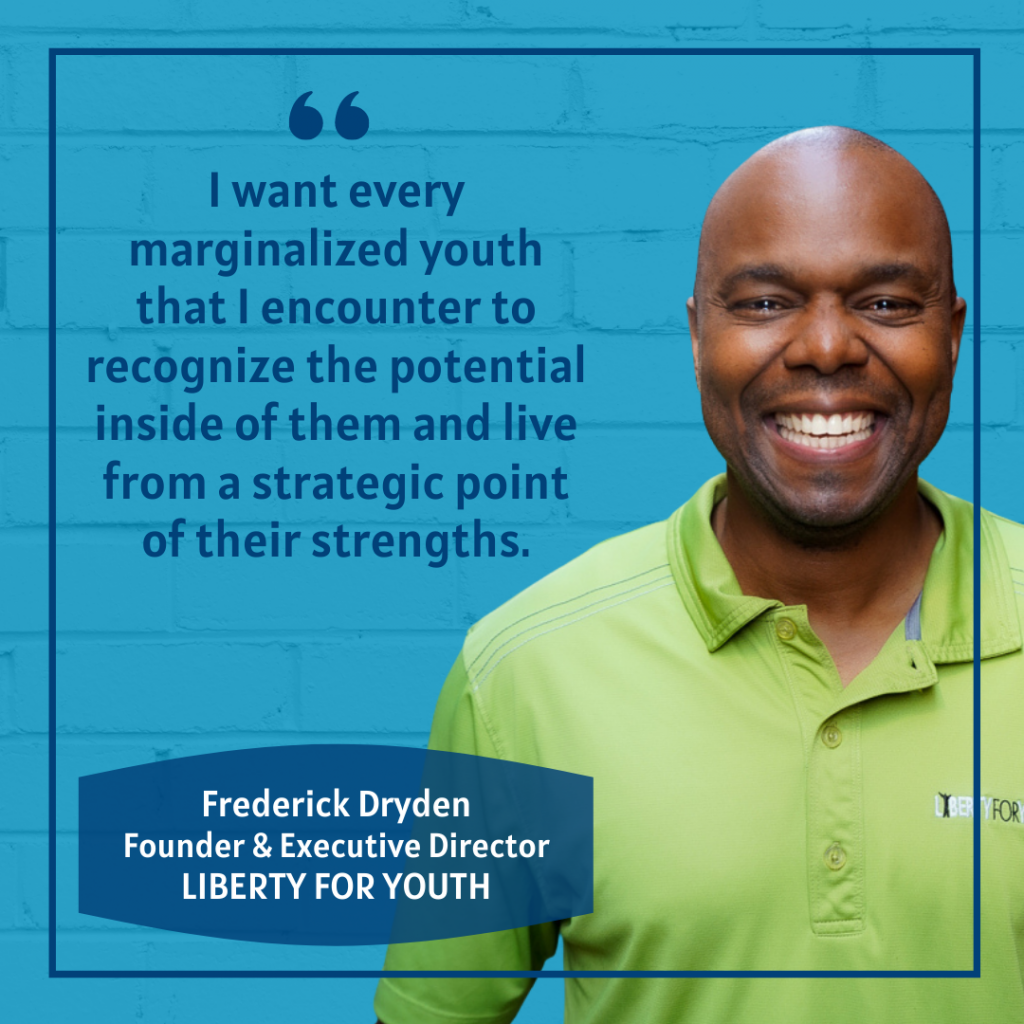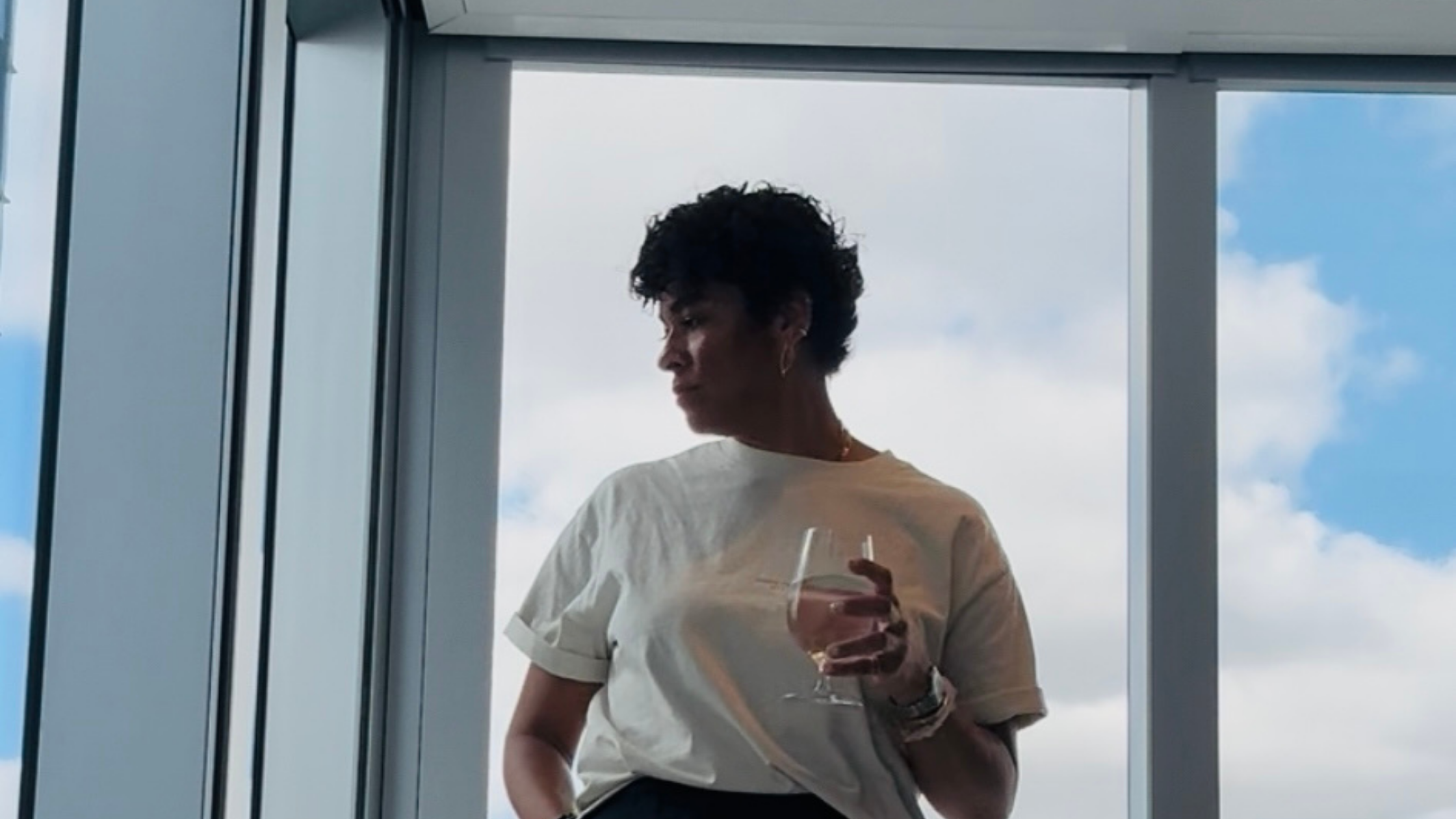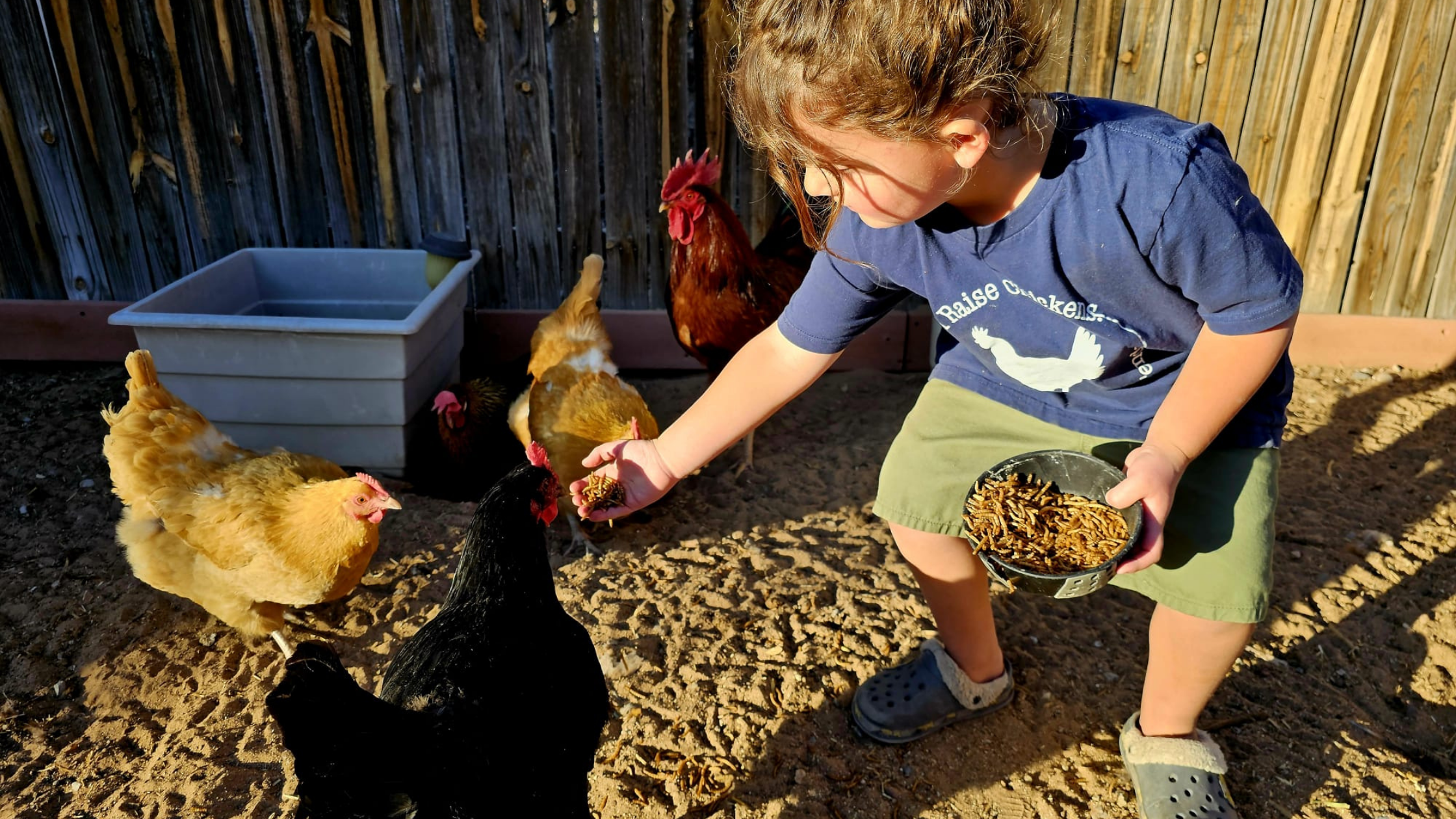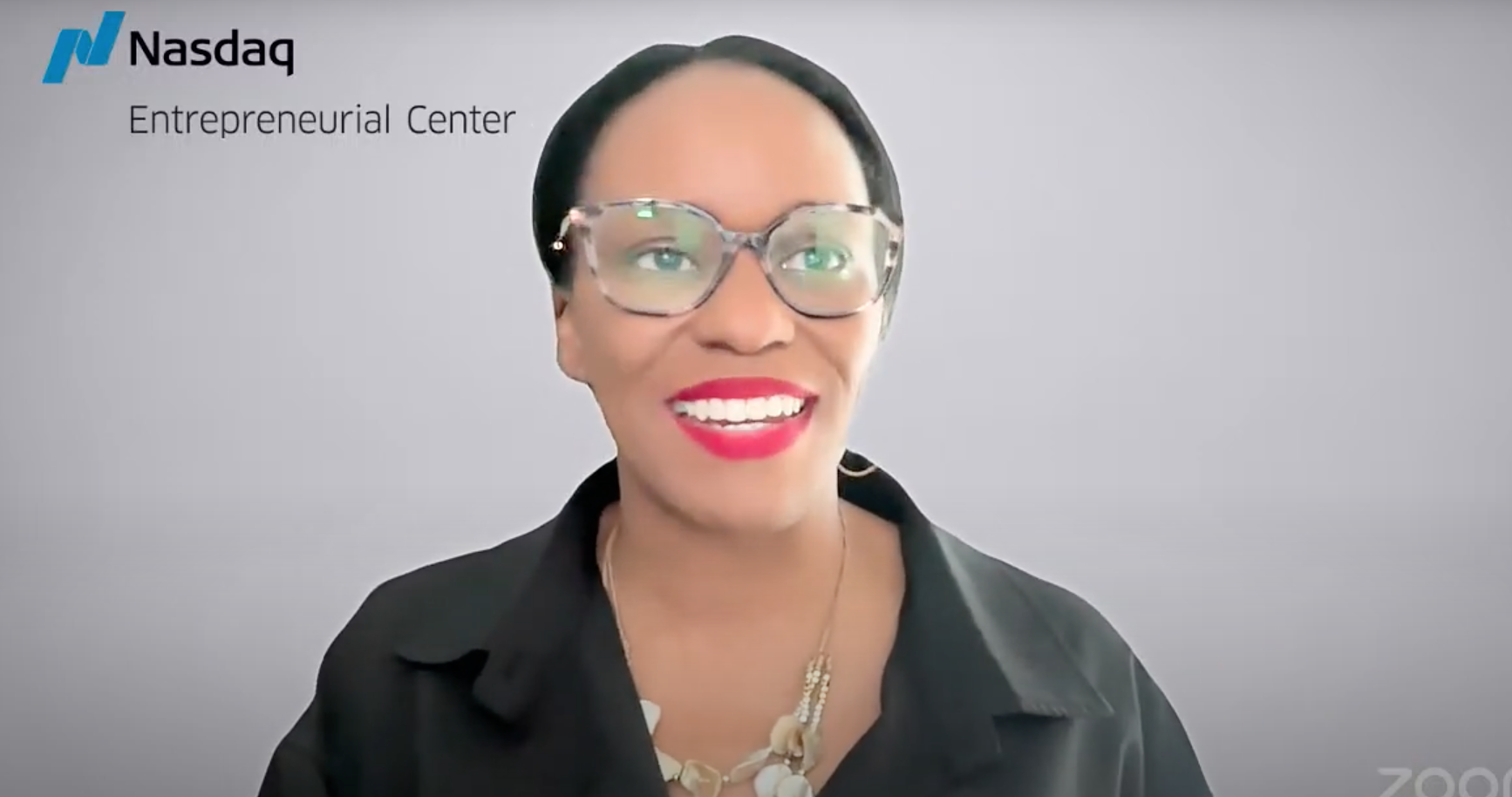Frederick Dryden was born in Montego Bay, Jamaica. When he was 11 years old he migrated to Ontario where, as a teen, he experienced abuse. Following that ordeal, Frederick was inspired to start Liberty For Youth (LFY), a not-for-profit charitable organization that provides a prevention and intervention mentoring program aimed at youth, ages 12 to 25 and alumni beyond 25, living in Ontario, Canada who are involved in, or at-risk of, criminal behavior. LFY, founded in 2004, provides a place where at-risk youth feel accepted regardless of their mistakes, struggles, or situations in life. Frederick has recently released his first book entitled “Running For Their Lives” which captures his at-risk teen years, when he experienced homelessness and was in conflict with the law, along with his Run For Youth journey, a 3 week marathon between Ottawa, ON to Hamilton, ON – over 700 kilometers – during which he conducted over 72 speaking engagements along the route.
What does “entrepreneurship” mean to you?
Frederick Dryden: Providing a service or product that provides a solution to making our country a better place to live for a profit. Our profit Is Improving the quality of life for at-risk youth and contributing to safer & healthier communities.
How did your company come to be?
FD: My ‘A-ha moment’ was in 2002, when I served as a volunteer mentoring a 16-year-old, incarcerated youth. Upon his release I adopted him and assisted him with high school completion. Upon graduation, we funded a scholarship that assisted him in studying at aviation school. In 2004, registered Liberty For Youth as a charity, quit my job and began serving youth full-time.
 How has your business changed in response to the COVID-19 pandemic?
How has your business changed in response to the COVID-19 pandemic?
FD: Our at-risk youth are dealing with challenges they’ve never faced before. Mental health issues, social isolation and suicidal thoughts are all on the rise. We have currently seen a 500% increase in suicide attempts over the pandemic and sadly two youths lost their lives. Liberty For Youth staff have also noticed an increase in youth alcoholism and drug use.
We immediately moved to virtual programming. This has allowed us to stay connected to our youth during the entirety of the pandemic. We have been able to offer weekly individual and group tutoring services, support the online education experience, coordinate counseling services, include virtual program content (instructional videos, life skills, inspirational podcasts etc.), virtual mentorship sessions and offer co-op and volunteer opportunities. Additionally, we held a virtual graduation ‘year-end’ party for any youth completing high school.
As keeping our youth safe is our priority, partnership funding allowed us to retrofit two of our vans to include plexiglass shields. We also used masks, gloves, cleaning supplies and hand sanitizer to ensure proper sanitation measures were adhered to. This allowed staff to safely deliver care packages, transport youth to appointments, conduct mobile basketball programming in driveways (with weights, training equipment, basketballs etc.) and continue providing 1-on-1 mentoring support to many youths experiencing increased mental health concerns/suicidal thoughts.
Care Packages were also a vital part of our connection and care of the youth. Many youths were isolated and could not leave their homes due to family restrictions or the virus itself. Inside the care packages were little notes of inspiration and a range of different items (food, clothing, basic need items.) Educational devices were also provided to any youth in need.
What is your proudest and darkest moment so far?
FD: Darkest moment: Due to funding shortages a few years ago, Liberty For Youth had to reduce programming and our hours of operation. Many youths were making progress in their lives prior to the funding loss. One particular night when our youth centre was closed, a youth who was benefitting from our programming called for help. We missed this call due to the reduced hours and unfortunately, he was murdered a few hours after the call. A similar situation occurred with another youth who was trying to escape a gang involvement situation.
My proudest moment was completing my three-week, 21-day ‘Run For Youth’ marathon between Ottawa and Hamilton. The Run For Youth initiative was designed to raise awareness to address youth issues such as: incarceration rates, high school dropout rates, unemployment, poverty, and homelessness etc. The ‘Run For Youth’ also raised over $700,000 in funding to create program sustainability.
How is your company changing the landscape?
FD: I wrote a book entitled ‘Running For Their Lives’ to address statistics and policies around at-risk youth issues, while providing an evidence-based solution that is more cost-effective than our present youth incarceration costs.
Creating national awareness on youth issues by changing policies for youth and young adults in partnership with Police and OPP Services. Developing projects to address systemic gun, gang and drug related crimes in Ontario through partnership with the Department of Justice Canada. Producing documentaries to address youth unemployment, by showing youth the connection between Trades and youth employment.
What do you wish you knew when you started? Is there anything you would do differently?
FD: I thought I would be able to spend more time with the youth, but I am constantly tied up with fundraising. (Approximately 65% of my time.)
What advice/credo do you live by as you grow the business / what is your professional and personal mission statement?
FD: I want every marginalized youth that I encounter to recognize the potential inside of them and live from a strategic point of their strengths.
Mission Statement: Liberty For Youth develops mentoring relationships with youth at-risk or involved in the justice system – helping them to build character and create positive lifestyles filled with opportunity and personal success.
Where do you find inspiration when faced with challenges?
FD: As a Christian, I find inspiration from my faith.
What does “success” look like for you? What do you think will help you achieve it?
FD: When a youth is developing life skills and social skills to maintain consistent employment, it keeps them out of the welfare and judicial system. We have the program structure, staffing and experience. We need the funding to provide the opportunities that build these employability skills.
Has personal or professional “success” changed for you since the COVID-19 pandemic?
FD: No, my vision has become evidently more significant, as during the pandemic we have experienced a 500% increase in suicide attempts. This pushes me to work harder.
What is it like to work alone or with your partners? What advice do you have for fellow entrepreneurs about building and leading teams?
FD: At times I enjoy working alone, however collaboration brings diversity and specific expertise.
When building a team, It is important to find people who can accessorize your weaknesses and/or limitations.
Many entrepreneurs continue to perfect their daily routines to support their work and greater vision; would you mind sharing your morning routine or a regular ritual that grounds your work each day? How has it changed in recent months?
FD: 5:30 – 6:00 am: I wake up early to complete a daily bible devotion and spend time in prayer.
6:00 am – 7:00 am: I focus on evaluating the strategic goals of the organization and how they’re being incorporated into the operational plan.
7:00 am: I make breakfast for my family.
7:40 am – 8:40 am: I drive my children to school and then drive myself to the office.
8:40 am: I start my workday.
My routine has remained the same over the past months, I believe in consistency.
What keeps you motivated during this time?
FD: Knowing that we are producing the future leaders of Canada keeps me motivated during this time.
What kind of an entrepreneur do you want to be known as, as in, what do you want your legacy to be?
FD: I want to be known as an entrepreneur who builds up people, shows them their potential and helps them unlock their purpose.
What is a quote or some words of wisdom that help get you through the tough days?
FD: On any given day, one bad decision could make me lose everything.
Have you experienced mentorship in your career? Do you feel it was easily available to you?
FD: I have experienced mentorship many times in my life, but it was not easily available to me.
I was homeless, hungry and at one of the lowest points in my life, when a teacher took the initiative to reach out and mentor me. This was the first time I received good mentorship in my life.
Who are the people who have mentored or influenced you in your life or career? How has their influence changed the trajectory of your entrepreneurial journey?
FD: It was three mentors that I encountered in my life that helped shape my entrepreneurial spirit.
My grade 9 teacher who invited me for breakfast and tutoring twice a week, encouraged me to not drop out of school. A police officer who mentored me when I had been in trouble with the law. And a youth pastor, who encouraged me to forgive the individuals who had sexually abused my siblings and I.
Do you have someone you’d like to nominate to be profiled in our Faces of Entrepreneurship series? Please let us know by emailing media@thecenter.nasdaq.org.




